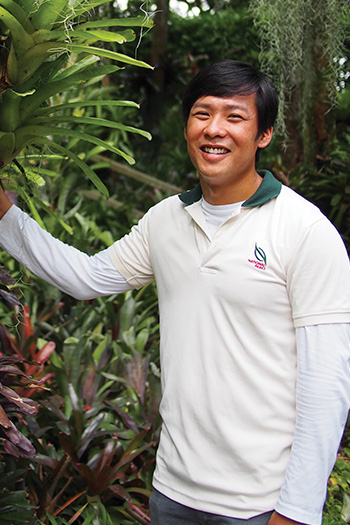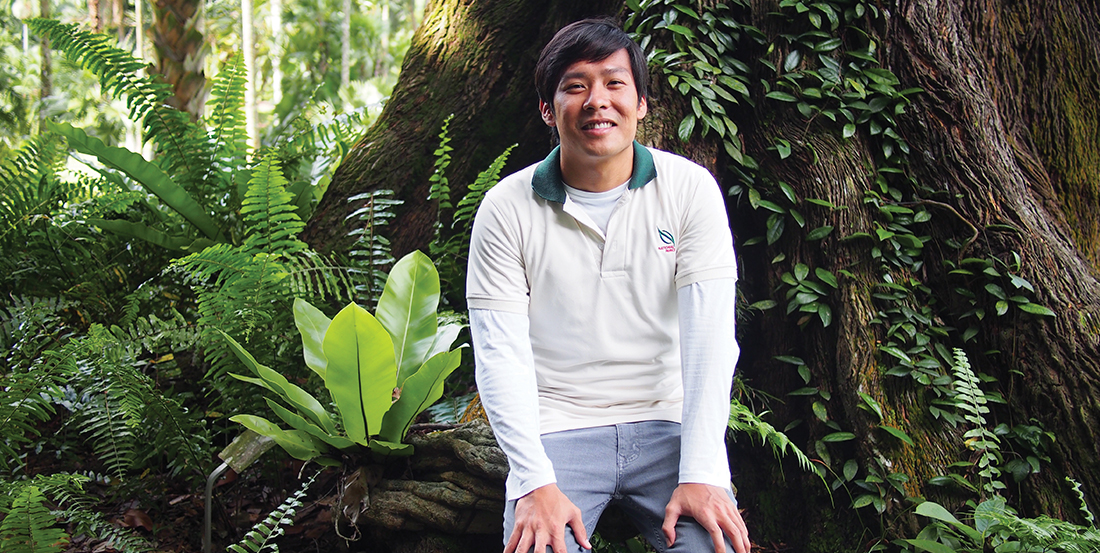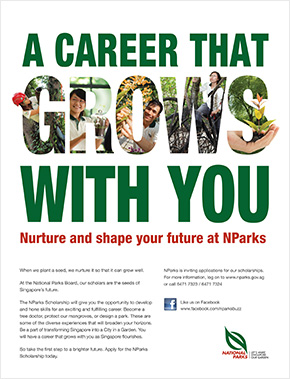The National Parks Board
(NParks), which aims to
achieve and enhance
biodiversity in urbanised
Singapore, is made up of
individuals who commit
themselves to greening
up our City in a Garden.
Singapore is not just a little red dot – it is also a lush garden city. All we need to do is look
beyond the window to see the integration of greenery into our modern urban development.
The sight of rows of trees lining our roads and parks amidst skyscrapers is a familiar sight
to all who live here.
NParks is largely responsible for our garden-city’s greenery. It also takes charge of linking major
parks, nature areas and residential areas with park connectors and engages the community through
driving green-related initiatives. It even has an app dedicated to guide people as they locate and
explore Singapore’s parks and gardens!
We talk to Thaddaeus Cheng, who tells us how the NParks Scholarship has given him opportunities
to learn from various field experts and support NPark’s vision to develop and maintain our green
infrastructure.
What is your job scope like and what are some of your responsibilities?
Thaddaeus Cheng: I manage the urban greenery along road verges in Singapore. This includes
the carrying out of tree inspections and other tree-management work to ensure the health and
structural stability of trees. I also work closely with landscaping contractors and colleagues from
other departments and agencies in the design and implementation of planting schemes and the
pruning, removal and transplanting of trees, shrubs and turf.

Thaddaeus Cheng Xin Wei
NParks Undergraduate Scholar
Designation:
Manager (Streetscape)
Studied:
Bachelor of Science in Ecology
and Environmental Biology,
Imperial College London, UK
In addition, I attend and respond to public feedback. NParks takes such feedback very seriously
as these are valuable sources of information from the ground that are essential to our progression
towards becoming a City in a Garden.
A recent initiative that I am fortunate to be
a part of is the enhancement of greenery for
selected Mass Rapid Transit (MRT) stations.
It has been extremely enriching to work with
agencies such as LTA to implement such a
comprehensive strategy that maximises all
available space such as covered link-ways,
external walls and roofs.
Tell us more about NParks' role in managing Singapore’s green spaces and environment.
Thaddaeus: A key challenge faced by
NParks is the scarcity of land amidst rapid
development. With many competing land uses,
it can be challenging to maintain and enhance
our green identity. As a result, we have to come
up with novel approaches to green-up urban
areas. One such example would be the NParks
Skyrise Greenery Incentive Scheme (SGIS),
which helps buildings in their efforts to 'greenup'
vertically. In Singapore, over 60 hectares
– an equivalent of 84 football fields – of green
roofs have been installed in more than 500
buildings. This is essential to NParks’ vision to
transform Singapore from a Garden City to a
City in a Garden.
What opportunities have you enjoyed as an NParks Scholar?
Thaddaeus: My scholarship with NParks
allowed me to study overseas, where I was
exposed to various foreign organisations
doing related work. Time spent with these
organisations broadened my horizon and
perspective on things. For example, in my
second year, I secured an internship with a
Swiss-based Non-Governmental Organisation,
Association pour le Développement des Aires
Protégées (ADAP). I spent around two months
in a remote area of Western Tanzania collecting
research data. This involved leading a team of
village game scouts out in the forest where we
would live for a couple of weeks at a stretch,
placing and retrieving camera traps before
returning to the village.
This internship highlighted the operational
challenges of conservation efforts, something
which is definitely not taught in the classroom.
I gained valuable first-hand experience about
wildlife and also gleaned insights into the socio-economic
situation in Africa and its intimate
connection with the natural environment.
"As I go about my day-to-day business in Singapore, I derive a great sense of satisfaction from taking some time to enjoy the environment and knowing that I played a role in creating it."
In addition, I spent the summer of my first
year in university as a research assistant for
Operation Wallacea, an organisation which
runs conservation management programmes
around the world. I spent two weeks in the
Peruvian Amazon region, where we lived in
houseboats and conducted a variety of surveys
daily on animals ranging from mammals to fish.
Following that, I went to Honduras, where
I spent two weeks diving off the Caribbean
islands to learn about reef ecology. This was
followed by another two weeks of trekking in
the jungle as we researched on boa constrictors
and spiny-tailed iguanas!
How has NParks facilitated your personal and professional development? What do you look forward to in the future?
Thaddaeus: NParks has offered me a myriad
of opportunities to learn from various field and
industry experts. The courses and workshops I
have attended covered a wide range of topics,
bolstering my knowledge on ecosystem
services and even honing my ability to write
proposals. NParks has indeed
constantly encouraged me to expand
my knowledge and interests.
And like many NParks staff, being
constantly surrounded by lush greenery is
definitely one of the highlights of my work. As
I go about my day-to-day business in Singapore,
I derive a great sense of satisfaction from
taking some time to enjoy the environment and
knowing that I played a role in creating it.
Furthermore, all of NParks different
departments are united by a common vision. I
hope to be able to work in other departments in
the future to gain a more holistic understanding
of the organisation. It will definitely enable me
to contribute more to growing our City in a
Garden.


